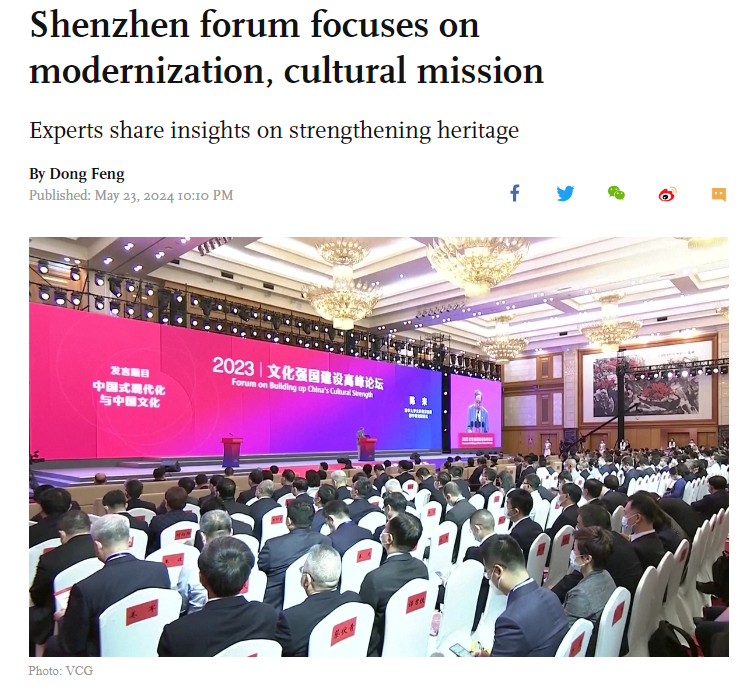LATEST INSIGHTS
Your Present Location: LATEST INSIGHTSLin Shangli: Shenzhen forum focuses on modernization, cultural mission
Source: GT Published: 2024-05-23

The Forum on Building up China's Cultural Strength 2024 is being held in Shenzhen, South China's Guangdong Province from Thursday to Friday. Convening Chinese media professionals, experts and officials, the forum focuses on the theme of 'Chinese Modernization and New Cultural Mission.'
Experts at the forum are sharing their insights on how to strengthen China's cultural heritage. The forum consists of a main forum and eight breakout sessions. In breakout sessions, the agendas cover creative work in literary and artistic domains, developing all-media communication systems, the protection of cultural heritage and innovative development of the cultural industry. Experts are also exchanging ideas on fostering talents in the publishing sector, high-quality development of the film industry and cultural trade and building the humanities sector in the Greater Bay Area (GBA).
As a cultural forum of the highest level in China, the event is being hosted by the Publicity Department of the Communist Party of China Central Committee. As the power of a large country rises, the prosperity of its institutions and culture inevitably emerges. The forum will help promote the high-quality development of the cultural sector, provide rich ideological resources and drive intellectual momentum.
In her keynote speech, Honorary President of the Dunhuang Academy Fan Jinshi stated that Dunhuang cultural heritage is conducive to promoting peaceful coexistence, exchanges, integration and mutual learning among the diverse cultures in the world today.
'Through exploring and promoting the pioneering spirit of the Chinese nation contained in the cultural heritage of Dunhuang, we can also play a positive role in building a great modern socialist country in all respects and fulfill the Chinese Dream of national rejuvenation,' Fan noted.
'By building cultural confidence, continuing our historical mission, and guarding and inheriting the roots of Chinese culture, we can enhance national cohesion,' she added.
Given that human society has reached the stage where it needs to redefine itself and define the world and the future, Lin Shangli, president of Renmin University of China, pointed out in his speech that whoever gives a definition that conforms to the inherent laws of human social development can become the leader of human ideas and values.
'We can surpass the Western value dogma and institutional hegemony and develop a new worldview, values and methodology system based on the all-round development of people and the creation of effective governance as the main axis,' said Lin.
Wang Bo, a vice president of Peking University, said that the spirit and temperament of Chinese culture cannot be ignored.
'The advanced character of Chinese culture is reflected in the cultural paradigm of unity of the spirit and the temperament of upholding fundamental principles and breaking new ground,' Wang said.
Upholding fundamental principles and breaking new ground is a dialectical unity of continuity and innovation, he explained.
China is the only uninterrupted ancient civilization in the world. This continuity is a basic feature of Chinese culture recognized by Chinese and foreign scholars.
'The core of upholding the fundamental principles is the conscious inheritance of the subjectivity of Chinese culture. The essence of striving to be creative is to respond to the problems of the times,' noted Wang.
Meanwhile, the sub-forum on building the humanities sector in the GBA will be held on Friday. Experts such as Kenneth Fok Kai-kong, a deputy from the Hong Kong Special Administrative Region to the 14th National People's Congress; Mario Ho, chairman and co-CEO of the NIP Group; and well-known artist Han Meilin from Tsinghua University will participate in the breakout session, sharing their insights on humanistic spirit of the GBA and giving suggestions on jointly shaping up the humanistic features of the region by sharing opportunities.























































































 京公网安备 11010802037854号
京公网安备 11010802037854号





